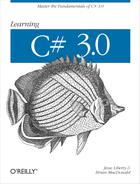- Learning C# 3.0
- A Note Regarding Supplemental Files
- Preface
- 1. C# and .NET Programming
- 2. Visual Studio 2008 and C# Express 2008
- Before You Read Further
- The Start Page
- Projects and Solutions
- Inside the Integrated Development Environment
- Building and Running Applications
- Menus
- Summary
- Test Your Knowledge: Quiz
- Test Your Knowledge: Exercises
- 3. C# Language Fundamentals
- 4. Operators
- 5. Branching
- 6. Object-Oriented Programming
- 7. Classes and Objects
- 8. Inside Methods
- 9. Basic Debugging
- 10. Arrays
- 11. Inheritance and Polymorphism
- 12. Operator Overloading
- 13. Interfaces
- What Interfaces Are
- Implementing an Interface
- Implementing More Than One Interface
- Casting to an Interface
- The is and as Operators
- Extending Interfaces
- Combining Interfaces
- Overriding Interface Methods
- Explicit Interface Implementation
- Summary
- Test Your Knowledge: Quiz
- Test Your Knowledge: Exercises
- 14. Generics and Collections
- 15. Strings
- 16. Throwing and Catching Exceptions
- Bugs, Errors, and Exceptions
- Throwing Exceptions
- Searching for an Exception Handler
- The throw Statement
- The try and catch Statements
- How the Call Stack Works
- Creating Dedicated catch Statements
- The finally Statement
- Exception Class Methods and Properties
- Custom Exceptions
- Summary
- Test Your Knowledge: Quiz
- Test Your Knowledge: Exercises
- 17. Delegates and Events
- 18. Creating Windows Applications
- 19. Windows Presentation Foundation
- 20. ADO.NET and Relational Databases
- 21. LINQ
- A. Answers to Quizzes and Exercises
- Chapter 1: C# and .NET Programming
- Chapter 2: Visual Studio 2008 and C# Express 2008
- Chapter 3: C# Language Fundamentals
- Chapter 4: Operators
- Chapter 5: Branching
- Chapter 6: Object-Oriented Programming
- Chapter 7: Classes and Objects
- Chapter 8: Inside Methods
- Chapter 9: Basic Debugging
- Chapter 10: Arrays
- Chapter 11: Inheritance and Polymorphism
- Chapter 12: Operator Overloading
- Chapter 13: Interfaces
- Chapter 14: Generics and Collections
- Chapter 15: Strings
- Chapter 16: Throwing and Catching Exceptions
- Chapter 17: Delegates and Events
- Chapter 18: Creating Windows Applications
- Chapter 19: Windows Presentation Foundation
- Chapter 20: ADO.NET and Relational Databases
- Chapter 21: LINQ
- Index
- About the Authors
- Colophon
- Copyright
It is important to distinguish exceptions from bugs and errors. A bug is a programmer mistake that should be fixed before the code is made available to users. An exception is usually not the result of a programmer mistake (though such mistakes can also raise exceptions). Rather, exceptions are raised as a result of problems that you can predict, but can’t prevent, because they depend on factors outside your program. A network connection dropping suddenly, or running out of disk space, are both examples of exceptions that you can handle.
An error is caused by user action. For example, the user might enter a number where a letter is expected. Once again, an error might cause an exception, but you can prevent that by implementing code to validate user input. Whenever possible, you should anticipate user errors and write code to prevent them, instead of relying on exceptions.
Even if you remove all bugs and anticipate all user errors, you will still run into predictable but unpreventable problems, such as running out of memory or attempting to open a file that no longer exists. These are exceptions. You cannot prevent exceptions, but you can handle them so that they do not bring down your program.
-
No Comment
